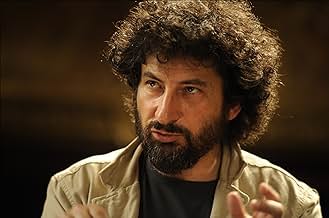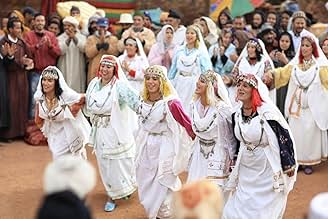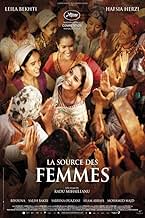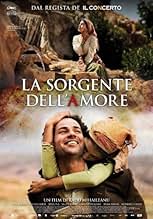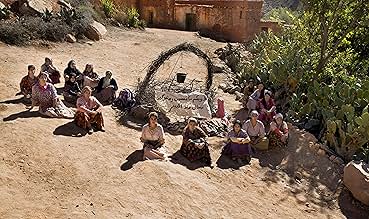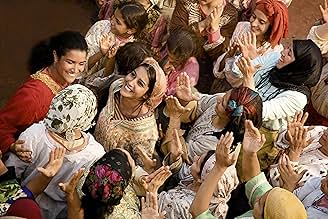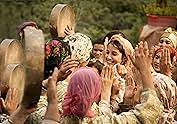IMDb RATING
7.2/10
4.3K
YOUR RATING
A comedy/drama set in a village and centered on a battle of the sexes, where women threaten to withhold sexual favors if their men refuse to fetch water from a remote well.A comedy/drama set in a village and centered on a battle of the sexes, where women threaten to withhold sexual favors if their men refuse to fetch water from a remote well.A comedy/drama set in a village and centered on a battle of the sexes, where women threaten to withhold sexual favors if their men refuse to fetch water from a remote well.
- Director
- Writers
- Stars
- Awards
- 2 wins & 4 nominations total
- Director
- Writers
- All cast & crew
- Production, box office & more at IMDbPro
7.24.3K
1
2
3
4
5
6
7
8
9
10
Featured reviews
Brilliant, delicate, delicious, poetic.
A brilliant, delicate, delicious & poetic movie. The music (composed by Armand Amar) is superb. Radu Mihaileanu knows to picture the tragedy with a big touch of love and hope. The movie denounces the injustices that live the majority of women in the Arab countries, with a touch of beauty and comedy. Radu Mihaileanu shows us that to change the reality without violence is still possible in this violence world. Another jewel from this amazing director who surprised us in the past with incredibly beautiful and powerful movies such as "Train the vie" (1998), "Va, vis et deviens" (2005) and "Le concert" (2009). Antonia Tejeda Barros (Madrid, Spain).
Finally, courage!
Finally, a movie dares to speak about the unspoken, about the reality behind the so-called "freedom of worship"; finally, someone has the guts to denounce the unbearable situation of women in those regions, or even in our regions because of the laxity of our democracies, ready to flout human rights in the name of a would-be tolerance! This cannot stand any more: voices have to raise, the tables have to be thumped, the headscarfs have to fall. Women aren't objects, and this movie reminds us of it well. It is time for them to get back their dignity, to take control of their lives, to become the equal of men. The movie succeeds to combine the seriousness of this situation with some touches of humor, bringing us back to the absurdity of men behaviour whose anxiety, frustration and lack of confidence in themselves led to the destruction of many women who just wanted to live.
When Cinema Reflects My Mother's Story
As a Moroccan viewer, I found La Source des femmes very moving and, in many ways, accurate. My own mother grew up in a village where women were responsible for carrying water long distances every day, so the film's story felt very familiar. The way it shows the physical and emotional toll this work takes on women-especially during pregnancy or after childbirth-is something many families from rural Morocco can relate to.
The performances are strong, and the film captures the solidarity, humor, and resilience of village women beautifully. It reminded me of the way women in my mother's generation leaned on each other, not just to survive the hard labor but also to push back against unfair traditions.
That said, while the film succeeds in showing the reality and the spirit of resistance, it sometimes feels a bit too polished and simplified-almost like it was made more for international audiences than for the communities it portrays. Real village life is often harsher, with less of the romanticized touches we see onscreen.
Still, it's rare to see a mainstream film center women's voices in a North African village, and for that reason, it resonated deeply with me. It may not capture every nuance, but it does highlight an important truth: women have always carried the weight of their families and communities, sometimes literally, on their backs up the mountain.
The performances are strong, and the film captures the solidarity, humor, and resilience of village women beautifully. It reminded me of the way women in my mother's generation leaned on each other, not just to survive the hard labor but also to push back against unfair traditions.
That said, while the film succeeds in showing the reality and the spirit of resistance, it sometimes feels a bit too polished and simplified-almost like it was made more for international audiences than for the communities it portrays. Real village life is often harsher, with less of the romanticized touches we see onscreen.
Still, it's rare to see a mainstream film center women's voices in a North African village, and for that reason, it resonated deeply with me. It may not capture every nuance, but it does highlight an important truth: women have always carried the weight of their families and communities, sometimes literally, on their backs up the mountain.
Mihaileanu gets better and better
Every time I see one of Radu Mihaileanu's amazing films I think he cannot make a better one than that, and then he does. This is probably the best yet. The story is set in an anonymous North African location, but the film was shot in a wild and remote village in Morocco somewhere in the vicinity of Marrakesh. As usual, many of the supporting actors seem to be indigenous local inhabitants. The film was shot in Arabic, but it seems that in France the dialogue was dubbed into French, whereas the English language DVD has the original Arabic dialogue with English subtitles, which is thus more authentic. The lead actress, of magical beauty and talent, is Leila Bekhti. She is of Algerian descent but was born in France. The actress who plays her sister Loubna/Esmeralda, Hafsia Herzi, was also born in France and is of mixed Tunisian and Algerian descent. Bekhti's vicious and unbalanced mother-in-law is played by Hiam Abbass, an Israeli Arab who has acted in 65 films. Mihaileanu has been very clever to find these amazing actresses, who are all completely convincing as locals who inhabit the small village where the story is set. This is a film about women who rebel against the oppressive customs of their lazy, and often brutal, husbands, who justify their indolence and oppression of their wives by 'tradition', or sometimes by unconvincing references to their religion. For hundreds, or perhaps thousands, of years, the women of the village have brought the village's water in buckets from the spring ('source' in French, hence the title). The spring is high up the mountain slope behind the village, and the pathway is very rough and difficult. Many of the women have had miscarriages because they slipped and fell carrying the buckets of water while they were pregnant. We see an instance of this near the beginning of the film. While the women exhaust themselves and lose their babies by these exertions, the idle husbands sit on a small terrace sipping mint tea all day long because they have no jobs. It has never occurred to any of them to fetch the water or assist his wife. They just sit there, lazy slobs that they are. And if a baby dies, so what. The situation becomes intolerable to her, so Leila Bekhti rebels, supported by the aged widow called Vieux Fusil (Mrs. Rifle in the subtitles), magnificently portrayed by the actress Biyouna, who is a true native Algerian. Bekhti persuades other women in the village to go on 'love strike' by denying their rampant husbands their nightly sex. Many of the women get beaten, and some get raped when the husbands become furious and violent. Bekhti is secretly supported by her own husband, who genuinely loves her, and he sneaks out at night to carry some buckets of water down from the spring himself, the only man in the village who ever does so. He does this on the quiet because he is afraid the other men might attack him violently if they knew that he had done 'women's work'. One gets a very good idea why nothing ever happens in North Africa by way of business development, since there appears to be no initiative amongst the men, who are mostly seen to be arrogant, spoiled, pompous, querulous, and many of them are very violent indeed, almost psychopathically so. An Imam lectures the women that it says in the Koran that a man should beat his wife if she is disobedient. However, Bekhti, who is the only woman in the village who can read, quotes to the old Imam rival suras from the Koran and a Hadith ('Sayings of the Prophet') text which crush his arguments, so that he becomes dejected and ceases to oppose them. Many of the men of the village organise a scheme to renounce their wives and get new, obedient and excessively religious wives to come in and take their place. But the Imam ends his support for this scheme after Bekhti defeats him in her theological arguments. One of the most strenuous opponents of the women is Nissam, the son of Biyuona. She fearlessly berates him, tells him he is a good for nothing, and eventually throws him out of the house. This film tackles head-on the problems of the oppression of women and religious fanaticism in the Muslim world in North Africa. One of the remarkable aspects of the film is that the women communicate their stories and grievances by improvising songs rather than by speaking, which seems to be a local custom. They repeatedly shame their men by out-singing them. This is an extremely profound and very deep examination of life in a remote ethnic community, and a story of great courage. The film is both extremely emotional and deeply disturbing. It is never possible to watch a Mihaileanu film without being both shaken and stirred. It is another triumph for that brilliant director, a Paris resident of Romanian origin, who is certainly one of the finest film directors working in Europe today.
Unusual
I don't know what I'm voting on. Lysistrada by Aristophenes was much wittier, but the point of this movie is not wit.
Perhaps I'm voting on the wonder that it was made at all. We in the west have a very different view of what Muslim countries should produce given our media.
This film does not fit into that category. None that I've seen do. None proclaim death to the west. None want to commit murder in the hope of getting multiple virgins as a reward.
None do anything but examine daily life. What was set in Toronto Canada. A second was set in the middle east on the Israeli Lebonon border, a third was made in New York and now this one from North Africa. All of them were gentle films that made comments about the human condition.
And all including this one were well worth seeing. The film is a little long and the music is an acquired taste, but be patient. It will reward a patient viewer.
Perhaps I'm voting on the wonder that it was made at all. We in the west have a very different view of what Muslim countries should produce given our media.
This film does not fit into that category. None that I've seen do. None proclaim death to the west. None want to commit murder in the hope of getting multiple virgins as a reward.
None do anything but examine daily life. What was set in Toronto Canada. A second was set in the middle east on the Israeli Lebonon border, a third was made in New York and now this one from North Africa. All of them were gentle films that made comments about the human condition.
And all including this one were well worth seeing. The film is a little long and the music is an acquired taste, but be patient. It will reward a patient viewer.
Did you know
- TriviaThe basic premise of the plot, the withholding of sexual relations by women to force their menfolk to do something, is first noted in the play, 'Lysistrata' by Aristophanes. Several versions of "Lysistrata" have been filmed for cinemas and television, with the most recent being Chi-Raq (2015) by Spike Lee.
- Quotes
Vieux Fusil: If you hate just one man, you hate everyone in the community.
- SoundtracksDaqqa
Traditional
Performed by La Daqqa de Marrakech
- How long is The Source?Powered by Alexa
Details
Box office
- Gross worldwide
- $5,605,676
- Runtime
- 2h 15m(135 min)
- Color
- Sound mix
- Aspect ratio
- 1.85 : 1
Contribute to this page
Suggest an edit or add missing content


